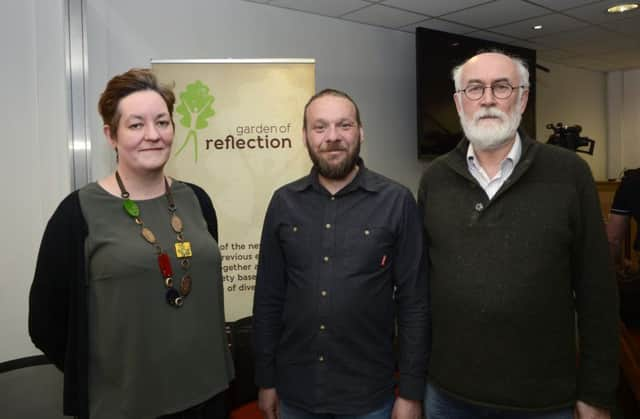Former British solider says he was taught to dehumanise Northern Irish civilians


Lee Lavin was speaking at the Holywell Trust lunchtime testimony sessions organised by the Garden of Reflection on Wednesday.
The former soldier, whose experiences in the army led to him being diagnosed with post traumatic stress disorder, said he didn’t hate the Nationalist people during his time serving in South Armagh, he just couldn’t feel anything, he had been dehumanised.
Advertisement
Hide AdAdvertisement
Hide AdHis testimony was listened to by local woman Kay Duddy whose brother Jackie was shot dead on Bloody Sunday, and Fiona Gallagher, whose brother Jim was shot dead by a British solider in 1976.
Eamonn Baker, who led the discussion which included the biggest audience the weekly sessions have seen, said this was not an event which would evolve into a political discussion but one which people could respond to with their hearts.
Lee explained how he came from an affluent town, but lived in the village’s only row of social housing.
“I left school with no qualifications and went into the army,” he said.
Advertisement
Hide AdAdvertisement
Hide AdHis training prior to coming to Northern Ireland was at a British army base called a ‘Riot Village’.
“We had mock riots,” he said. “Bullets came out of windows and bins would explode. It was very intense. But we were given no historical context of what was going on in Northern Ireland.”
In February 1994 Lee was stationed in County Down for a two year tour where he was part of the group who were providing security for the rebuilding of the Crossmaglen Police Station.
“We had 2,000 soldiers there,” he said. “The more we were attacked, the more fearful we became.
Advertisement
Hide AdAdvertisement
Hide Ad“In August they announced the ceasefire. When I heard they had been negotiating the ceasefire for years I remember thinking, ‘why have I been putting my life on the line?’”
Lee began reading up on Irish history and in April 1995 was asked to be a British army representative with a club from Newry going to a Celtic match.
“That was a real awakening for me,” he said. “The people became human to me. Although I wasn’t a soldier at Bloody Sunday or Ballymurphy, I thought of the possibility that I could have been one of those soldiers. It was the end of the line for me as a soldier.
“The people at the end of the gun became human. I lost that ability to dehumanise.
Advertisement
Hide AdAdvertisement
Hide AdLee detailed how after the army he battled alcohol and drugs before being diagnosed with PTSD and now speaks of his experiences regularly.
“I’ve been back to the places which caused my trauma and to the places where I caused trauma,” he said.
“This has become the best treatment for me. It has allowed me to take ownership of my past.”
Kay Duddy, said she wanted everyone in the room to pray that the legacy of Bloody Sunday is not carried into the next generation.
Fiona Gallagher said she and Lee had become good friends. “I don’t see him as a uniform,” she said.
For full report see this week’s Sunday Journal.